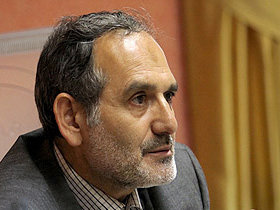Baku, Azerbaijan, Dec. 18
By Dalga Khatinoglu- Trend:
Former high-ranking Oil Ministry official believes that any gas export is against Iran's interest.
Iran has the world's biggest has reserves, holding 33.6 trillion cubic meters, or 18 percent of global proved gas reserves, but has been suffering from gas shortage.
Mahmood Khaghani, now retired, who has had over 33 years of service in senior international positions in the Iranian Oil Ministry, including as the head of the ministry's Caspian Sea and Central Asia Department told Trend Dec.18 that the first priority for Iran is developing the petrochemical sector, fed by natural gas to boost value-added products instead of exporting the raw gas. "Therefore, delivering gas to any country including Europe is not a serious matter, while there is not any real transport project on the table".
Iran has about 135 million cubic meters of gas per day (mcm/d) export contracts with Iraq, Oman and Pakistan. The Middle Eastern country also exporting about 27 mcm/d of gas to Turkey, while itself suffers from gas shortage in winter.
Khaghani who served as the director for energy, minerals and environment at the ECO Secretariat in 1996-2000 added that Iran currently hosts the Economic Cooperation Organization (ECO), the regional ten states with 450 million population, including Azerbaijan and Turkmenistan with huge gas reserves.
He said that during the third minstrel meeting of ECO (December 2008), the members of ECO decided to convert a part of their gas production to electricity and establish a power grid to export the power to other countries like Iraq, Syria, even EU.
Khaghani added that exporting power is more profitable than exporting the raw natural gas.
Currently, Iran exports about 8 billion KWh of electricity annually.
"Unfortunately the present gas transferring projects are political-motivated plans," Khaghani said. The former oil ministry's top official said that EU should take part in Iran's upstream gas project and after producing the gas, it's their own option to choose whether they want to transfer this gas through pipeline to EU, or they want to produce LNG, etc. Iran shouldn't think of supplying its own produced gas to Europe.
He said that Iran should also feed its gas to petrochemical units.
Iran's petrochemical sector's capacity is about 60 million metric tons per annum, but Iran produced only 40 million tons of petrochemicals during the last fiscal year, ended on March 2014.
Despite increasing the country's gas production by 15 percent during 2014, the output gas hasn't met the petrochemical units' needed gas feeds yet.
The latest report about the country's petrochemical production level during the last eight months, indicate that Iran produced only 30 million metric tons of petrochemicals, due to shortage in gas feedstock.
Iran increased gas production, a major feedstock for petrochemical units, by 75 million cubic meters per day (mcmpd) during 2014 -mostly after July- however, the internal consumption growth was in a high level that delivering more gas to petrochemical units remained approximately unchanged.
Iran increased gas supply to the domestic sectors by 11 billion cubic meters (bcm) during first eight month of current fiscal year to 110.75 bcm, which of 39.525 bcm was supplied to power plants, indicates a 7.9- bcm increase, according to the National Iranian Gas Company's statistics. Then, Iran only increased about 3.1 bcm of gas supply to other sectors, including housing, industrial sectors, CNG plants, gas injections to old oil fields, etc.
On the other hand, Iran's housing sector's gas consumption rose by 2.5 times since last month (compared to the last months in spring and summer) to above 365 mcmpd and is expected to reach 450 mcmpd in winter).
Iran's gas production level in 2013 was around 485 mcmpd and with regarding a 75-mcmpd increase during 2014, the country's production is about 560 mcmpd. However, Iran is supplying 110 mcmpd of gas to the industrial sector, then the country wouldn't increase the petrochemical production level during winter and the final production likely would stand at 42 million metric tons in current fiscal year.
Dalga Khatinoglu is an expert on Iran's energy sector, head of Trend Agency's Iran news service
Follow him on @dalgakhatinoglu
Edited by CN






